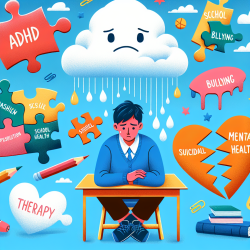As a practitioner working with adolescents diagnosed with Attention-Deficit Hyperactivity Disorder (ADHD), understanding the intricate dynamics between school bullying, quality of life (QoL), and suicidality is crucial. Recent research has shed light on these relationships, offering insights that can enhance therapeutic approaches and inform future studies.
The Triangular Correlation: Bullying, QoL, and Suicidality
A study published in the International Journal of Environmental Research and Public Health explored the correlations between school bullying, QoL, and suicidality among adolescents with ADHD. The findings revealed significant triangular correlations, suggesting pathways from various types of school bullying to suicidality where personal competence and psychological well-being play key roles.
The study involved 203 adolescents diagnosed with ADHD. It utilized self-reported questionnaires to assess their experiences with school bullying, their QoL, and any suicidal ideation or attempts. The results highlighted that victimization from bullying could lead to decreased psychological well-being, thereby increasing the risk of suicidality.
Implications for Practitioners
The implications of these findings are profound for practitioners:
- Focus on Psychological Well-Being: Enhancing an adolescent's psychological well-being can serve as a protective factor against the negative impacts of bullying. Therapeutic interventions should aim to bolster self-esteem and resilience.
- Address Personal Competence: Improving personal competence—such as academic performance and social skills—can reduce the likelihood of being targeted by bullies. This can be achieved through individualized educational plans and supportive learning environments.
- Differential Approaches for ADHD Symptoms: Recognize that symptoms like inattention and hyperactivity/impulsivity may influence these pathways differently. Tailored strategies that address specific symptoms can be more effective in reducing risks associated with bullying and suicidality.
Encouraging Further Research
This study underscores the need for longitudinal research to establish causal relationships between these factors. Practitioners are encouraged to contribute to research efforts by documenting outcomes from interventions designed to improve QoL in bullied adolescents with ADHD.
A Call to Action
The role of practitioners extends beyond therapy; it includes advocacy for safer school environments and collaboration with educators to implement anti-bullying programs. By addressing these issues comprehensively, we can enhance the overall well-being of adolescents with ADHD.
To read the original research paper, please follow this link: Correlations between Quality of Life, School Bullying, and Suicide in Adolescents with Attention-Deficit Hyperactivity Disorder.










